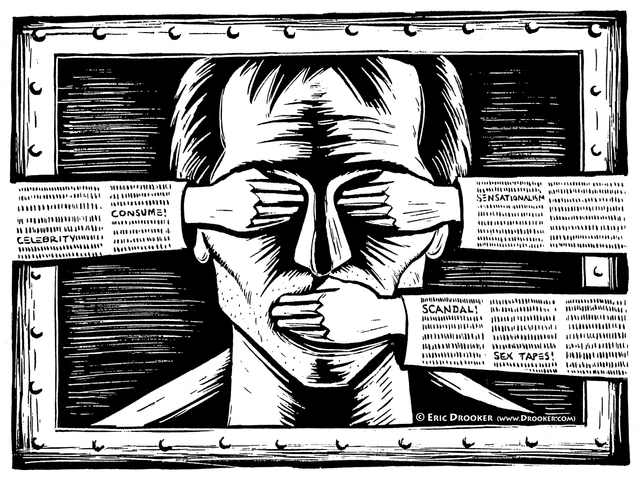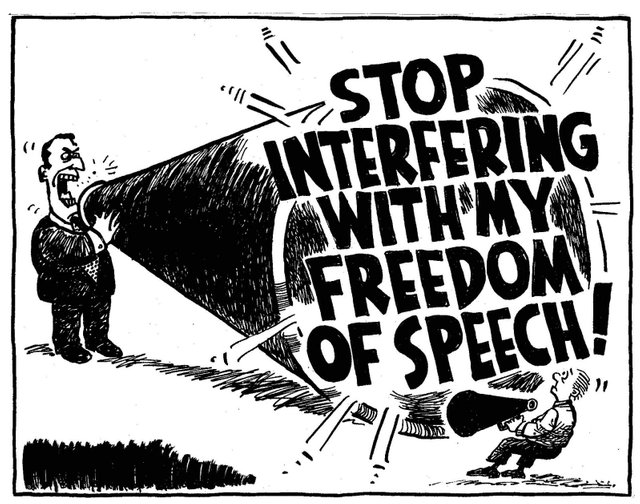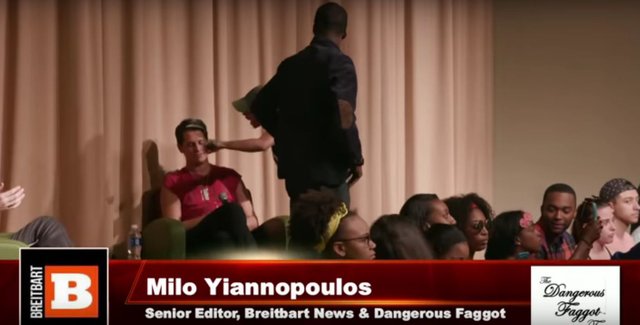You do not have a ‘right’ to free speech (and neither do I)
What does having a ‘right' to free speech mean? A right to speak freely, of course! But this answer just creates another question: Where? Where do you have a right to speak freely? You see, having a right to free speech is completely meaningless if there isn’t a place for you to exercise said right. Just as a right to any other action would be meaningless if you had nowhere to perform it. For example, do you have the right to fornicate on my kitchen table? Nope, you'd have to acquire permission first (Note: For those interested, it’s a “no”).
Thus, here I argue that a right to free speech is illusory, and fundamentally, useless. What really matters is property rights, not 'speech rights'.
Free Speech ‘Violations’

Whenever I hear news that someone’s right to free speech has been ostensibly violated, I have to resist rolling my eyes. Why? Because I anticipate what has become the standard reaction to such an event; which is for most people to inevitably engage in a monotonous analysis/debate regarding the content of the speech and whether it was hateful, offensive, insensitive, blah, blah, blah, [insert judgmental/condemnatory adjective here]. Such a response ignores the fundamental question necessary for resolving such a dispute: Was the person in question permitted to be where he was when his speech was supposedly stifled? If he wasn’t, then it’s case closed: He was trespassing and should suffer the consequences. However, if he was permitted to be at the location in which he chose to speak and was stifled, then an assessment of the situation is warranted.
Let’s begin with a straight-forward example: A family is having a picnic in their garden when a stranger appears and starts proselytizing. The family asks the stranger to leave and he refuses. Two family members grab the stranger and remove him from their property. Violation of free speech? Nope. Judging this scenario is easy because the owner of the property where the event took place is clearly defined.
Now imagine for a moment, a frugal, law-abiding bachelor who lives alone with his dog and large selection of fine wine. This particular bachelor is a doctor - well, he was a doctor - but he stopped practicing medicine 3 years ago and now prefers to get drunk in front of his TV as it gushes late night erotica into his bloodshot eyes whilst his dog looks on, thinking… You can finish that sentence and let me know if you like. Anyway, let’s imagine you’re a nosy so-and-so and feel like giving this guy a reality check with your disapproving tongue - ignoring the fact that he has a large sign on his front door that reads:
TO: EVERYONE
GO AWAY
SIGNED: GO AWAY
Do you have the ‘right’ to burst into his dark living room, interrupting his late night entertainment, in order to remind him that he could be saving children’s lives right now rather than trying to end his own? Nope. Perhaps you could send him a concerned email, or bump into him on the street (we’ll get to public property next) and give him a piece of your mind. Regardless, whatever you wish to say matters not if you can’t find a place in which you’re permitted to say it. Your ‘right’ to free speech has no power.
Public Property Breeds Conflict
As I alluded to above, the issue of free speech gets a bit more complicated when we venture into ‘public’ spaces.

People protest. And people tend to need a lot of room to protest in. Especially when they plan to invite thousands (or possibly millions) of other people to join them. Most people don’t own sufficient land to accommodate such a protest. Thus, they take to the publicly owned streets to make their voices heard. This usually (if not always) requires permission from the State.
So, let's imagine you've garnered permission, it's now the day of the protest, and everything's going well. Your pithy signs look great, all of your friends are standing beside you in solidarity with your cause, and you even make up some catchy chants that echo through the crowd. But then, a bunch of dissenters holding equally pithy (but disagreeable) signs arrive and start causing a ruckus. What is there to do? Well, your public police officers will surely see to those pesky invaders. But how are they to know who’s with you and who’s against you. There was no filter through which they came. No ID check. No time to ponder, a fight’s broken out between protesters. Who are they? Whose side are they on? Are there two sides? Three? Four? “Screw it,” an officer says, “just arrest them all.” And the tension rises and so does the number of protesters sitting glumly in the back of police vans, with righteous indignation protruding from their pores as they plead their innocence.
In public spaces, there’s no vetting. It’s ‘public’, thus anyone can waltz in and demonstrate how they’re right and you’re wrong - or simply provoke you. Even if you’ve obtained ‘permission’ to protest in a certain area, that doesn’t stop other people from showing up, regardless of whether they’re coming to support you. Thus, public spaces are terrible venues for exercising free speech. Conflict is inevitable.
When no one owns something, its quality deteriorates. The notion of the tragedy of the commons teaches us that self-interest in the absence of accrued costs incentivises people to take as much as they can get. That was a terribly abstract explanation so for those unfamiliar, see the video, below. Anyway, in the case of public spaces, everyone wants their speech to be heard and no one can tell others to pipe down, regardless of whether they agree or disagree, because it’s ‘their’ space, too.
Private Property
Private venues, with private security, are a far better alternative for those wishing to share ideas. Using a private space, you can host the most polarizing debate imaginable, provided people are willing to follow whatever rules you establish – which could range from none, to: if you use the ‘wrong’ pronouns you die! You could also use a private venue to create the ultimate echo chamber whereby disagreement simply isn’t tolerated.
Universities
Certain proponents of free speech have the romantic idea that universities should act as the ultimate facilitators of free expression. Now, I’m not saying this is necessarily a bad policy, but to assume it should be the standard to which all universities adhere is a purely collectivist notion. Let people teach and learn whatever they want. The market will decide what’s worth learning and what’s not.
If some universities want to turn their entire institutions into 'safe spaces', let them. The market response will be swift, with the human capital of students opting to invest time and money into worthless degrees being priced accordingly. We are already seeing the effects of universities which have chosen to embroil themselves in social-justice related controversies such as the University of Missouri, which in fall 2016, enrolled its smallest class of freshmen in almost a decade, and 1,600 less than the year prior.
Despite the sorry state of many Western universities, a sea change does seem to have begun, with the University of Chicago informing its Class of 2020 that it does not support 'so-called "trigger warnings,"' or 'condone the creation of intellectual "safe spaces."'
The DePaul Debacle
If you're familiar with the antics of one Milo Yiannopoulos, you may have felt the urge to dispute my claim that the private sector serves as a more productive environment for the communication of ideas. This is because when Yiannopoulos spoke at DePaul University, ‘a private, not-for-profit, Catholic institution’, he was verbally harassed and physically intimidated (perhaps even assaulted, although I’m not a lawyer) by members of the audience, whilst the venue’s security looked-on and did nothing.

This example would seem to suggest that private venues are no more immune to disruptions than those held in public spaces. However, this hasty conclusion does not take into account the fact that Breitbart, of which Yiannopoulos is Tech editor, and the event organizers, were actually required to pay for the private security for the event. The fact that private security guards, who were paid to maintain order at an event, idly stood-by and did nothing whilst it was disrupted, would seem (again, I’m not a lawyer) to be a clear case of fraud on the part of the security firm. The guards were paid for their services and did not deliver, thus it would appear that Yiannopoulos and the event organizers would be well within their rights to take legal action, if they were so inclined. Thus, the issue here is not with events held on private property as a whole, but rather with an isolated group of, to paraphrase Yiannopoulos, spineless security guards. Not to mention DePaul’s administrators and the Chicago police:
I talked to a few of the dozen Chicago police officers eventually called into the building, and they were irate. They were well-trained, and well-equipped to handle scenarios such as this. They wanted to do their job, and remove the protesters, but administrators demanded they stand passively and watch. Once again, violence prevailed over free speech on a liberal college campus, and the administration was 100% complicit. (The Huffington Post)
Social Networks, Private Property, & Hypocrisy
Social networks are playing an increasingly important role in the distribution of information and formation of public opinion. Thus, it is not particularly surprising that companies such as Twitter and Facebook have begun to use their power to augment what their large user-bases see. Facebook has been criticized for reportedly censoring opposing and unwanted views and Twitter appears to have been arbitrarily banning/suspending outspoken conservatives such as Milo Yiannopoulos and Charles C. Johnson, and critics of feminism, including Phil Mason, aka Thunderf00t. Again, most people would rather get into a dispute regarding the content of the controversial views that are supposedly being suppressed rather than acknowledging the fact that platforms such as Facebook and Twitter are privately owned and thus, removing content deemed inappropriate is no different than the aforementioned family removing an unwelcome proselytizer from their garden.
If derision is to be directed towards social networks such as Facebook and Twitter, it should be based on their hypocrisy, not their willingness to preferentially suppress or promote content.
Evidenced by the companies’ statements, below, it is clear that these social networks wish to present themselves as champions of free expression and equal opportunity.
Every Person - whether individual, advertiser, developer, organization, or other entity - should have representation and access to distribution and information within the Facebook Service, regardless of the Person's primary activity. There should be a single set of principles, rights, and responsibilities that should apply to all People using the Facebook Service. (Facebook)
Our mission: To give everyone the power to create and share ideas and information instantly, without barriers. (Twitter)
However, it will come as no surprise to learn that attached to these statements are an inordinate number of rules that can be interpreted however Twitter and Facebook wish them to be interpreted and enforced.
Thunderf00t highlighted this issue in a 2014 video regarding his own Twitter suspension:
You see, this is the thing Twitter: The terms of service are generally so broadly written that they can allow or preclude almost any behavior. What matters is how Twitter enforces them - as that de facto determines what the rules mean. And from your [Twitter's] actions, the rules now mean that you can be banned for the most vanilla criticism of a certain professional victim feminist; while allowing the most strident criticism of others. (Thunderf00t)
Herein lies the major issue: The actions of these social networks, which profess to want to promote free expression, contradict their public mission statements. It is important to understand that businesses have their own self-interest to attend to, just as every individual does. Therefore, the belief that these giant social networks, with the power to sway public opinion, happily allow information to flow freely through their platforms, without considering its potential impact, is incredibly naïve.
A reasonable approach is simply to remember that all of these companies have an agenda and are influenced by myriad financial interests. Their publicly stated goals aren't to be taken seriously.
YouTube Controversy: ‘Advertiser-Friendly’ Content
A big hubbub recently erupted due to changes made by YouTube regarding its guidelines for content creators. The change has led to many high-profile content creators’ videos being de-monetized. The new ‘advertiser-friendly’ guidelines have been labelled a form of ‘censorship’, with several high-profile YouTubers expressing their concerns.
To be perfectly frank, this is not censorship. It is the result of rational self-interest on the part of businesses interested in representing their products/services in ways they deem most appropriate and effective for their target audience.
Louis Rossmann’s reaction to the recent YouTube controversy is the most rational and empathic I have seen, thus far.
It may be the case that the new guidelines are so intrusive and damaging to large channels that they decide it’s no longer viable or worthwhile for them to publish their content on YouTube. Although unlikely, this could lead to a mass exodus. If this does occur and demand for a more open media platform is high enough, then the market will supply one. It goes without saying that Steemit is a perfect example of this.
In Closing
You do not have a ‘right’ to free speech. Property is all that matters. Identify who owns the property on which the speech took place (whether it be physical or digital) and issues regarding a person’s 'right' to speak become irrelevant. ‘Public’ venues are breeding grounds for conflict and more productive (but by no means perfect) exchanges of ideas are possible on privately owned land.
For those skeptical of what can be achieved in the private sector, I recommend the work of Walter Block, who has written extensively on issues pertaining to public versus private property.
Acknowledgements
I would like to think that my views on free speech are wholly original, but even within the young Steemit community, they’re not. Thus, before I end, I’d like to mention a few posts that helped inform this article.
First, the user @trashish (who may no longer be active) published a post which included the following statement: ‘[F]reedom of speech is a condition that stems only from a human being's right to property.’ A post by @anarchyhasnogods also highlighted the fact that we are only able to express ourselves online provided we have access to the internet. Thus, the property controlled by internet service providers (ISPs) is what is necessary for us to express ourselves, online.
Finally, I want to mention a post by @condra, which informed me of the recent YouTube controversy I discussed – and helped to broaden the scope of this article.
That’s it. Thanks for reading. And remember, everything is a remix.
Although this article is rather political, my formal education is actually in psychology. If psychology is of interest to you, I recommend visiting PsychologyTube for discussions on a variety of psychological issues from a critical perspective. The impetus for the channel was, in part, based on a dissatisfaction with existing YouTube channels which tend to simply echo the information found in most textbooks. Thus, PsychologyTube aims to engage viewers with challenging perspectives that aren't usually covered by the mainstream.
Really good post!
I agree with you, we do not have right to free speech. We must conjugate space, time and our emotional content, even in the best situation we are limited to a very narrow topics controlled by some kind of moderator.
Your right to free speech is inversely proportional to the size of your crowd!
I am a NNES
Thanks for your feedback and support, @quigua.
"I do not agree with what you say, but I shall fight for you to have the right to say it " Jean-Jacques Rousseau 1712 - 1778
https://en.wikipedia.org/wiki/Jean-Jacques_Rousseau
It was a time when you go in prison when you tell your opinion.
Ask Edward Snowden if this time has ended.
Hi @chrisaiki, thanks for sharing, however, you have incorrectly attributed that quote to Rousseau. The statement 'I disapprove of what you say, but I will defend to the death your right to say it' was actually written by Evelyn Beatrice Hall in her book, The Friends of Voltaire, and is often misattributed to Voltaire, himself.
https://en.wikipedia.org/wiki/Evelyn_Beatrice_Hall
https://steemit.com/philosophy/@ionescur/extremism-in-defense-of-free-speech-is-no-vice you might enjoy this
Thanks for sharing, @razvanelulmarin. This one must have slipped by me.
It is an interesting discussion and I feel like a lot of this is happening on YouTube right now where people's videos are being de-monatized for cussing and other things.